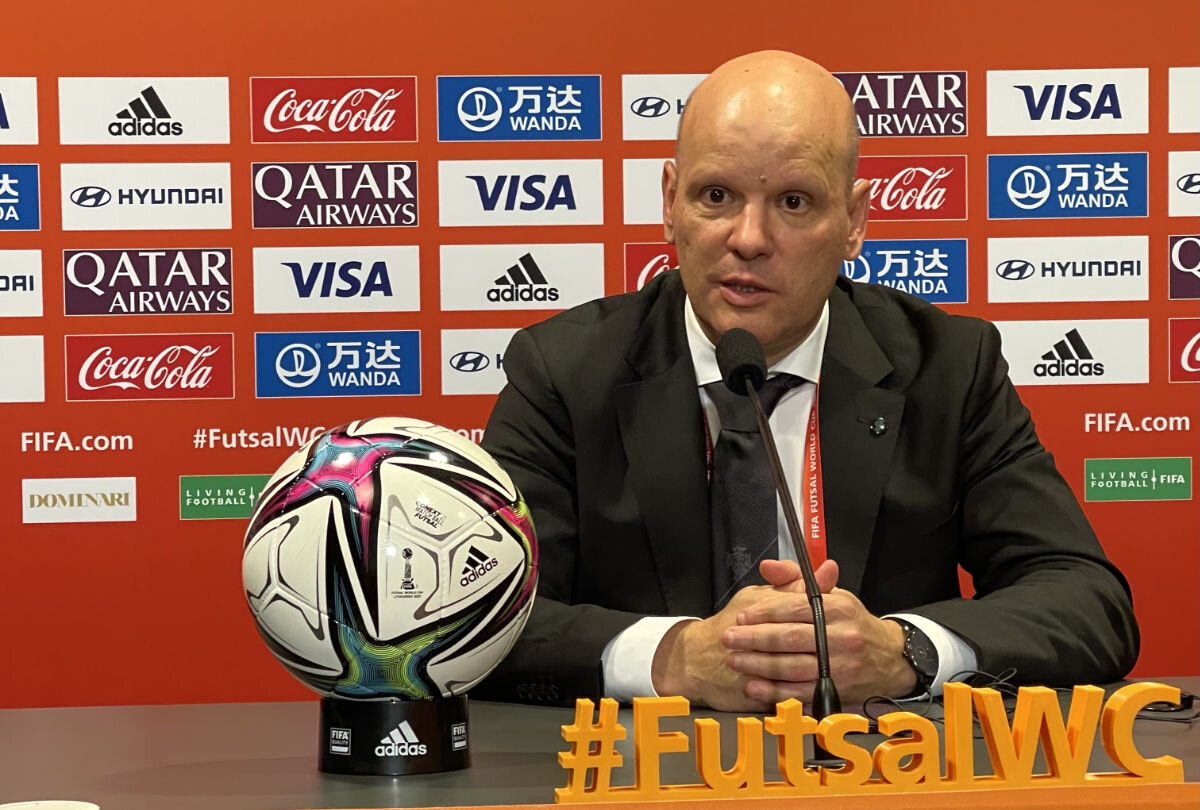Six reasons why Portugal won the futsal World Cup
• European champions write new chapter in history
• Belief, desire and Jorge Braz’s timing prove vital
• Zicky Té comes of age alongside Ricardinho
WE DIDN’T need the the stubborn grey rain clouds and drizzle. The mood in Rio Maior was dark enough. “Pior que aquilo é impossivel,” declared Ricardinho, with admirable frankness. Any worse was impossible.
Just 16 hours earlier, on a winter’s evening in early 2019, his Portugal team had been humbled 6-0 by “the daddy of futsal”, Brazil, in Sporting’s João Rocha Pavilion.
O Mágico’s recognition that things couldn't get any worse feature prominently in the Portugal chapter of Futsal: The Story of an Indoor Football Revolution. His thoughts were echoed moments earlier by the reigning world coach of the year, Jorge Braz. “We were not ourselves,” whispered a defiant Braz. “We will be much better tomorrow. For sure.”
As it turned out, “tomorrow” was not meant to be taken literally.
The Quinas, newly installed European champions, lost the return Friday night friendly match against the Canarinhas 4-0 at Benfica’s No1 Sport Pavilion. But Portugal were in the game. Chances were created as Braz indulged Portugal’s fervour for the 4-0 formation – “that's the way I most like to play,” Ricardinho told me – with occasional use of veteran pivot Tunha to mix up their approach. Ricardinho assumed control, probing, creating and pushing from a deeper position than the world had seen over two decades of 1v1 wing wizardry. The defeat on Ricardinho’s 161st appearance for his country flattered Brazil and offered a glimpse of future glory.
Nearly three years later – on the night of his 187th cap – Ricardinho rejoiced in “the greatest day of my life” after lifting aloft the World Cup trophy on a breathless night of history-making in Kaunas, Lithuania.
So after seeing Portugal up close, and chatting to Jorge Braz several times during the knockout phase in Vilnius and Kaunas, I offer my conclusions on how the seleção fulfilled his promise of a brighter “tomorrow” and wrote a new chapter in the stirring history of Portuguese futsal.
1) The belief
“I've been telling you for 20 years, you are better than them...”
Jorge Braz’s rare outburst, a motivational moment picked up on the TV cameras, came during a crucial time-out in the quarter-final clash against Spain. The three-times world coach of the year had seen enough.
He’d seen what perhaps some of the players could not. It was a vision of victory. In the match. And the tournament. Braz sensed it was there for the taking. From this moment, Portugal grew in stature and unassailable belief as they marched towards history in Lithuania.
“I knew it from the start,” replied Braz when I asked him after that game at which point he knew they would repeat the feat of the Euros final in 2018 by beating their more decorated Iberian neighbours. The sparkling recovery from two goals down did nothing to alter this conviction. Braz has since spoken about how “important and decisive” the mental side of the game is (while praising the team psychologist Jorge Silverio).
Navigating the psychological terrain helps players “reach the top of the mountain”, explained Braz.
2) The culture
“Played in schools, offices, on the streets or in pavilions … futsal is in the Portuguese DNA.”
The FPF made it clear with its pre-tournament message on Twitter, reflecting the nationwide growth of the game. “We wanted to make the game a sport of huge social relevance,” Jorge Braz explained when I interviewed him shortly after they won the Euros in 2018.
Futsal in Portugal is booming. FPF president, Fernando Gomes, and director Pedro Dias led the revolution a decade ago. Braz is the senior general marshalling the troops into battle. At the grassroots, it's a vibrant game for boys, girls, teenagers and adults of all ages.
And the fans crave O jogo rebelde, the “rebel game” of the streets and courts, echoing the stirring sentiment of country’s biggest sporting icon and childhood futsal lover, Cristiano Ronaldo. In Lithuania, with precious few fans at most games, the Portuguese were easily the most vocal, especially in the later stages, when attendances spiked to beyond four figures. The Kaunas streets thronged with fans, all singing from the same songsheet: ballads of adoration for their futsal heroes as uplifting and encouraging as fado is hauntingly melodic.
Video: Jorge Braz shares his secrets of Portugal’s success – creating their own players
3) The youngsters
“In our opinion, the only way to reach the level of the best is to create great players, great coaches and great directors. We've been investing a lot in that.”
Braz could have been talking about Zicky Té, the powerful 20-year-old boy from the streets now hogging centre stage for the world champions as well as Champions League winners Sporting.
Nicknamed Zicky after an influential cousin, Izaquiel Gomes Té moved from Guinea-Bissau with his family aged six, settling in Santo António dos Cavaleiros, just north of Lisbon. Scoring goals clearly runs in the family. Another cousin from the former Portuguese colony, Mesaque Djú, plays professional football for West Ham United under-23s in England.
After proving himself in the renowned Bafatá rink (a street playground named after a city in his birth country), Zicky graduated to futsal, signing for the Grupo Recreativo Olival Basto, a mile or so nearer the João Rocha Pavilion. It’s here where the powerful pivot with the winning smile now resides as one of seven world champions in the squad.
Along with his 21-year-old club team-mate, Tomas Paco, and Benfica’s fast-maturing ala Afonso, 23, Zicky heads a crop of fresh faces hailed by Jorge Braz as evidence of the Portuguese way of “creating” players by blooding them through the national youth teams. In the absence of the injured Cardinal, Zicky offered the team – and the fans – an alluring option to change their tune in pursuit of glory at crucial moments.
4) The veterans
While not quite as old a squad as Argentina’s, Portugal went to Lithuania with plenty of seasoned game nous to call on.
The three goalkeepers – André Sousa, Vítor Hugo and Bebé – are all closer to 40 than 30. The young pretender, Edu Sousa, 25, missed out due to Covid-19. Bebé’s momentous performances stood out. As the only part-time player in the squad – his day job is managing hs mother’s restaurant – his dedication and desire to make the most of his final World Cup gave the team a rock-solid foundation.
Of course, Pany Varela’s two strikes in the final sealed his place in history alongside greats of the game, such as Falcão, Manoel Tobias, Javi Rodríguez, Kike, Neto and three of his opponents in the final: Vaporaki, Brandi and Cuzzolino.
Maturing elegantly like a fine bottle of Port, the Sporting star finished one goal behind Ferrão in the race for the golden boot. And at the back, ruling the roost as a fixo supreme, Barcelona’s André Coelho erected another wall in front of “a parede” himself, Bebé.
Video: Jorge Braz on Ricardinho’s insatiable desire to reach his goals
5) The captain
“Ricardo, when he has a goal to achieve, he achieves it.”
Jorge Braz called it, speaking to me after the semi-final win over Kazakhstan that elevated the biggest name in futsal on to the highest stage of all. It was a match made in futsal heaven.
Back in 2019, after that humbling first Brazil friendly, six-times world player of the year Ricardinho left me in no doubt about his ambitious goal for the seleção.
“These are the type of teams we need to play against because that’s the level we are expecting,” he said.
He didn't like losing, he warned. But the objective was greater than one friendly match. “We are preparing for what we want – which is the World Cup.”
Not even a serious knee ligament injury just six months before the 2021 finals could stop the boy from the Gondomar streets, who says he was “chosen by futsal” as a teenager, completing an unrivalled set of honours with the elusive World Cup winner's medal.
Remarkably, the 36-year-old finished the tournament with the fourth highest total minutes on court among all players.
O Mágico, it's safe to say, now literally has it all.
6) The coach
Talent whisperer. Motivator. A supreme tactician thriving in the white heat of elite competition in a sport where the intensity on court almost defies reactive coaching.
Jorge Braz will certainly earn a fourth straight best coach in the world accolade. And rightly so. The thoughtful, elegant, multilingual “professor” of futsal is now a global face of the sport.
Ricardinho has his copy of Futsal: The Story. Another one is now heading to Jorge Braz as a reward for winning the biggest prize in futsal Photograph: Jamie Fahey
As well as pushing his nation to unseen success, judging with precision when to switch from 4-0 to a Zicky-focused 3-1 formation, he also fights for the game’s growth off the court. After yet another pulsating victory over Kazakhstan in the semi-final, Braz rejoiced in the number of tightly fought encounters.
“This is very good for futsal,” he explained. “All of the teams are more and more balanced. There’s no more seven, eight or nine zeros.”
Yet another example of Braz being driven by goals bigger than personal glory came minutes later. Wearing a warm smile, he strode over to me after the press conference to offer a compliment about Futsal: The Story of An Indoor Football Revolution, which he had been reading in the run-up to the tournament.
After politely inquiring about getting a second copy for a colleague at the FPF, he leaned in and listened intently as I responded with a challenge. “No problem,” I told him. “Go and win the final and it's a deal.”
The book is on its way. A small reward for Jorge Braz, the icon of Portuguese and world futsal who rose to the “top of the mountain” once again.
What’s your view? Add your comment below.










RICARDINHO’S PORTUGAL won the futsal World Cup. And after seeing Jorge Braz’s men up close in Lithuania, I offer my conclusions on how the seleção fulfilled Braz’s promise of a brighter “tomorrow” and wrote a new chapter in the stirring history of Portuguese futsal.